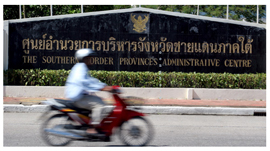Parliament endorses a bill to set up a special organization for the Deep South
 Without much fanfare and publicity, a bill which seeks to create a special administrative body for the four southernmost provinces which is to be officially named the Southern Border Provinces Administrative Centre was finally endorsed by the parliament on November 3. The bill will become effective once it was published in the Royal Gazette after it was Royally endorsed.
Without much fanfare and publicity, a bill which seeks to create a special administrative body for the four southernmost provinces which is to be officially named the Southern Border Provinces Administrative Centre was finally endorsed by the parliament on November 3. The bill will become effective once it was published in the Royal Gazette after it was Royally endorsed.
According to the bill, the southern border provinces include Yala, Pattani, Narathiwat and Songkhla. The prime minister will be the director of the centre which is a special administrative body that is not attached to the PM’s Office, any ministry or bureau. It will have a status of a legal entity and is commanded by the prime minister.
The secretary-general of the SBPAC has a status equivalent to a permanent secretary directly answerable to the prime minister. Previously, the status of the secretary-general of the centre was equivalent to a deputy permanent secretary.
By virtue of Article 9 of the bill, SBPAC has 14 major tasks which include, among others, drawing up a strategy plan for the development of the four southern border provinces in correspondence with the policy for the administration and development of the border provinces; to supervise, speed up or follow up the operations of civil servants who do not include judges and public prosecutors; to receive complaints and to assist those in distress as a result of unbecoming conduct of the officials. Another important task of the centre is to promote multi-cultural concept and to eliminate cultural discrimination.
With the consent of the Southern Border Provinces Development Committee, the SBPAC is empowered to designate any areas in the region to become a special development zone and to set the framework for administration and development of the zone.
However, the most important power vested on the centre by the bill is that the secretary-general is authorized to order the removal from the region of any official whose conduct was found to be unbecoming causing troubles to the people or rendering injustice to the people or whose conduct was deemed a threat to national security or good public order.
Any official ordered to be transferred out of the region must report to his or her original unit within seven days after which the unit in question must carry out the order immediately and then report back to the centre within 15 days.
However, the official in question has the right to appeal against the removal order to Administrative Court and also to the prime minister in his capacity as the director of the centre.
As for the other officials such as military personnel, prosecutors and judges or executives of local administrative bodies whose conduct are found to be unbecoming, the centre’s secretary-general can file a report together with incriminating evidences to the original units of those officials to consider taking actions against them within three days as from the date of receiving the report.
In case there is a complaint of injustice against the police from criminal suspects, the injured parties or their families, the secretary-general is empowered to summons the enquiry officer in question or his superior for an explanation.
Aside from the establishment of the SBPAC, the bill also seeks to create an advisory council for the administration and development of the southern border provinces. The council is made up of not more than 49 members handpicked by the prime minister.
The council will be represented by representatives from local administrative bodies, village and tambon heads, religious organizations, NGOs, media, women’s groups, educational institutes, trade organizations and academia who are not government officials.
-----------------------------------------------------------------------------------------
Photo by Jaroon Thongnuan
